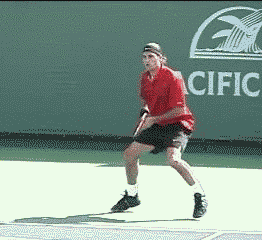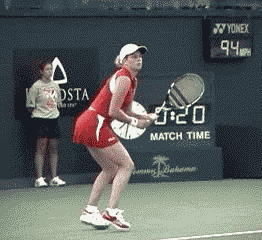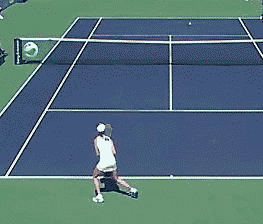|
TennisOne Lessons The Panacea For All ills: Watching The Ball Happy Bhalla ‘Watch the ball' is a phrase commonly mouthed by teaching professionals during most tennis lessons and dutifully repeated by players the world over as they play in recreational or tournament matches. This can be as easily witnessed at such hallowed venues as Roland Garros and Wimbledon as well as at your local country club or public park facility.
Why is this? How can players not be watching the ball? How often does the ball rocket towards your forehand and you move to hit a backhand? Surely this would be a common occurrence if we were really not watching the ball. So what do players who admonish themselves such and teaching professionals mean when they say, ‘watch the ball'. Obviously, the physical eyes are focused on the ball and yet somehow this does not appear to be sufficient to ‘see' the ball. The biggest obstacle to seeing the ball clearly is our mind. In order for us to truly understand and explore this statement, we need to briefly look into the nature of the mind: its function and the manner of its operation. The mind functions in the past when it recalls that which has already occurred or in the future in the form of hopes, dreams and ambitions. Both time frames are not real, in that the past has already occurred and is over and the future is simply a wish, a projection of what we think we want and need. Consequently, if we are in this present moment, the mind cannot function and guess where the ball is? As the ball leaves the opponent's racquet and travels through the air we need to be present to that movement until we make contact with the ball. The ball is moving towards us in the here and now and if the mind is active, we cannot be in the here and now because activity of the mind takes us out of it. Often, what happens is that the mind is silent and therefore able to watch the ball hit by our opponent (no anxiety is present because the ego is not involved while watching the opponent's hit), but as the ball begins to make its way towards us tension can arise. The source of this tension is invariably connected in someway to the outcome or result of our impending shot. It can also be simple activity of the mind, for example I may have a conscious thought about how to hit the ball or even where to hit the ball.
Peak performance occurs when one is in the present moment. However, to be in the present moment does not seem to be easy for most of us, although historically mystics from various traditions tell us it is extremely easy because it is our natural state of being. It is a state of being we cannot actively pursue or engage, but something that happens to us when we realize that this present moment is all there is and we can therefore drop all our goals, desires, dreams, hopes ambitions, and plans and just be. To be contented and completely satisfied right now is a state of being, which our society does not encourage because it feels that ‘progress' would be stunted. The argument continues that it is dissatisfaction and ambition that has brought our civilization forward. But what is ‘progress'? Is progress moving around in luxurious cars instead of bullock carts or living in mansions as opposed to mud huts? Or is progress the transformation of discontented individuals to happy ones? Is progress the transcendence of anger, hate and violence? Is progress the understanding that greed and the accumulation of ‘stuff' do not change our life in any significant manner? Silence will fall onto a mind that has realized that “all that glitters is not gold”. The attraction to things that build or enhance our ego will only fall away when we can see the ego for what it is, a mere shadow, but not the real thing. Until that happens, the mind will remain active in order to devise ways to build itself up. Consequently, in tennis the mind will always struggle with silence until it realizes that winning and losing are not inherently different in the greater scheme of things. That winning does not make us more and consequently losing does not make us any less. In both situations, the essence of who we are remains untouched. Only then can we enjoy the present moment and when there is contentment here and now there will be no need to indulge in self-projected fantasies.
This experience of silence has long been associated with peak performance in sports. In all studies of professional athletes who have experienced ‘the zone', that state of being where peak performance happens, mention is constantly made of an effortlessness, which arises through an increased awareness. Many athletes have spoken of how the ball slows down and appears to move in slow motion. This happens at times when we are really ‘watching' the ball, with a completely silent mind. When that happens we are in the zone. It is not that the ball slows down, but that the activity of the mind, which draws our attention away from the ball, appears to speed up the ball. In fact, the ball neither speeds up, nor slows down. We create both illusions depending on the state of being we happen to be in. Every unforced error in tennis is, in my experience, a mental error. When the mind is active we cannot be in the present, when we are not in the present it is extremely difficult to make clean contact with the ball. Those players who think before points and after points, must, during points become silent, if they are to be able to hit the ball cleanly. Ironically, this will be without realization because one cannot, by definition, be aware of silence, one can only be aware of noise. It is in silence that we play our best tennis because it is only in silence that we can see the ball and how can we play our best if we cannot see the ball. Consequently, real success in tennis and life never depends on the outcome; rather it is always about ourselves in the process. We cannot always win on the court, but we can always sing our song and dance our dance and surely to be able to do that is the true meaning of success. |



